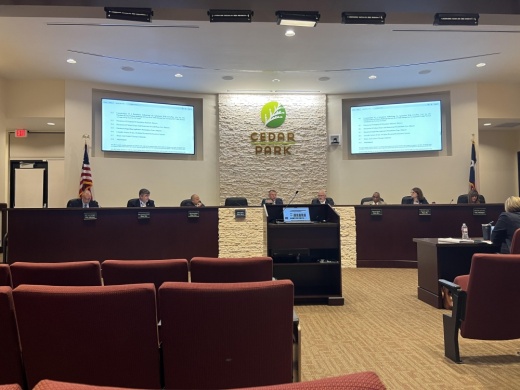UPDATED April 29
Cedar Park city council approved the installation of cell phone use prohibition signs on all existing school crossing zone signs across the city at the April 28 meeting.
After the discussion about the signs at the April 14 meeting, city staff conducted a field survey of surrounding cities to see what would be the most appropriate sign to install. Neighboring cities are using TxDOT's standard S7-1T sign. Council agreed to also use the standard S7-1T sign.
The cost to install the new signs should not exceed $7,000, and the city will use existing fiscal year 2022-23 sign and light maintenance funds, according to city documents. Signs can appear as early as next week, Stephen Hanuscin, assistant director of public works, field operations, said at the April 28 meeting.
ORIGINAL STORY April 27
Editor’s note: This story has been updated to clarify information about the Texas Transportation Code as well as City Council’s April 14 meeting.
Following reported auto-pedestrian accidents near Reagan Elementary School, Cedar Park City Council acknowledged that a Texas transportation law—making cell phone use prohibited in school zones—has not been enforced in the city due to no signage about the prohibition.
A 2009 state law prohibits the use of wireless communication devices while operating a moving motor vehicle in a school speed zone, unless the device is hands-free as defined by the regulation.
However, according to the Texas Transportation Code, cities are not able to enforce the law unless the proper signs are installed about the prohibition.
“Jurisdictions that have [signs] up right now in our area ... it’s city of Leander, city of Round Rock, city of Georgetown,” Mayor Corbin Van Arsdale said in the April 14 meeting. “Basically it sounds kind of like most of the other [cities], except for us."
The Texas Department of Transportation developed a standard sign for cities to use, the S7-1T, in response to the law in 2009. The statute allows either the city or the school districts to install the proper signage. Cedar Park did not install the S7-1T back then due to associated costs of installation and the sign’s inconsistency—it implies that all cell phone use is prohibited, not just handheld devices—according to city documents.
City staff presented three options for moving forward.
Option 1 would include no modification to current school zone signs. Under this option, the city would still be able to enforce a 2017 ban on all electronic messaging while driving, but not the 2009 law pertaining specifically to school zones, according to city documents.
Option 2 would be to install TxDOT’s standard S7-1T sign, which implies that even using Bluetooth or using a cell phone while the vehicle is stopped is prohibited.
Option 3 includes installing custom signs with the city's own choice of language, but the signs must have text only—no graphics, images or logos are allowed on custom made school zone signs, according to the Texas Manual on Uniform Traffic Control Devices, or the TMUTCD.
During its discussion April 14, council supported the city posting signage at school zones and enforcing the prohibition.
Cedar Park has a total of 72 school zone signs within city limits, said Stephen Hanuscin, assistant director of public works, field operations. Hanuscin said it would cost the city roughly $7,000 to install the S7-1T sign or to design and install its own at all current school zone sign locations.
“Sounds like the best $7,000 we’d spend all year,” Council Member Jim Penniman-Morin said at the meeting.
The council put this item—authorizing the city manager to direct city staff to install cell phone use prohibition signs on all 72 existing school zone signs across Cedar Park—as a resolution on its April 28 meeting agenda.





